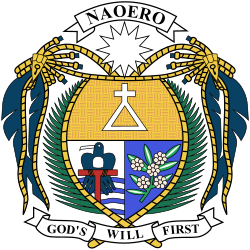Voting system
The 19 seat members of the Parliament of Nauru are elected through the Dowdall System, a decimalised modification of a preferential Borda count. The voter must rank all candidates in order of preference (see preferential voting). Each vote is then counted using the formula 1/n, according to ranking order. For example, a candidate ranked first receives one point, the second candidate receives half a point, the third candidate receives a third of a point, and so on. Each legal vote is aggregated in order to determine a decimal score for each candidate. [3] For example, in the June 2010 Nauruan parliamentary election the then president Marcus Stephen regained his Anetan Constituency seat after receiving 349.617 decimal votes from a total of 630 votes. [4]
Referendums
A two-thirds majority is required for referendums to pass. [5] [6]
Voter eligibility and election administration
The voting age in Nauru, as specified by the Article 29 of the constitution, is 20 years old. [7] Voting is compulsory for citizens of Nauru. Early voting is held for the week before elections, for Nauruans who cannot make it to the polls on election day. A proxy can be appointed if a Nauruan citizen is out of the country on election day. [8]
Elections in Nauru are administered by the Nauru Electoral Commission. [9] Before its founding in 2016, elections were administered by the chief secretary, a political appointment by the president. [10]
This page is based on this
Wikipedia article Text is available under the
CC BY-SA 4.0 license; additional terms may apply.
Images, videos and audio are available under their respective licenses.
